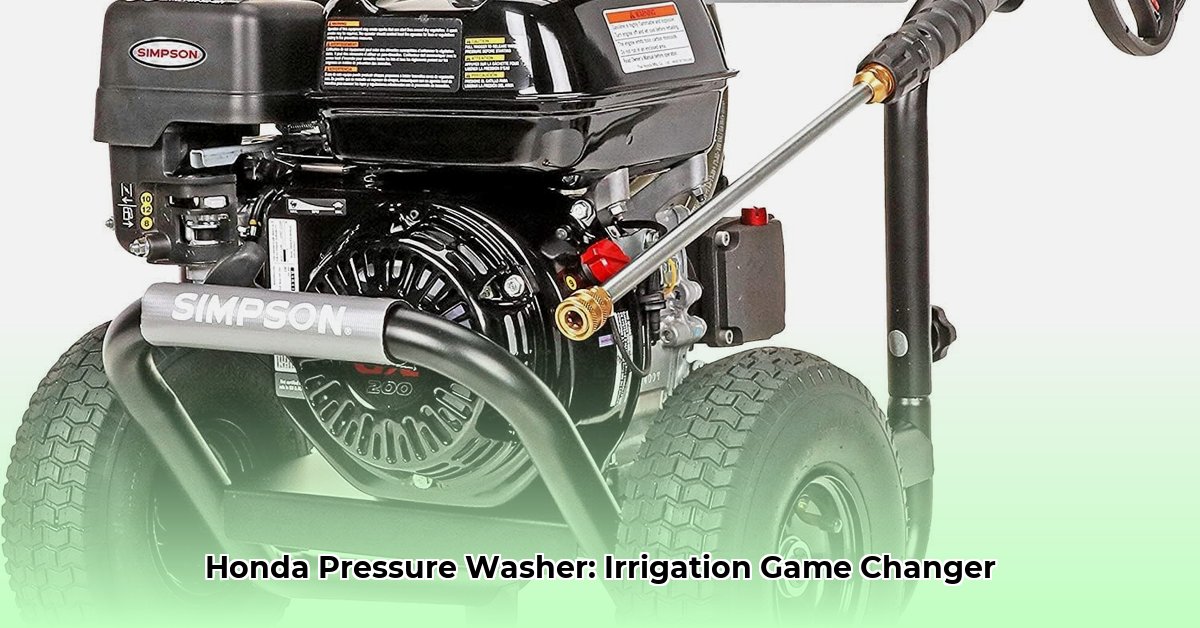
Water conservation is paramount in modern agriculture. Efficient irrigation is key to maximizing yields while minimizing environmental impact. Maintaining irrigation systems, however, requires regular cleaning to prevent clogs and ensure optimal water delivery. This article explores how a Honda pressure washer, readily available at Tractor Supply, can significantly improve irrigation efficiency, contributing to sustainable farming practices. For additional water management solutions, check out these submersible pump options.
Optimizing Water Usage in Agriculture: The Role of Irrigation Maintenance
Water scarcity is a growing concern globally, particularly for agricultural production. Farmers are increasingly adopting water-wise technologies and practices to enhance efficiency and resource management. This includes techniques like drip irrigation, rainwater harvesting, and smart irrigation scheduling. However, the effectiveness of these strategies hinges on the condition of the irrigation system itself. Clogged sprinklers, debris-filled filters, and damaged pipes lead to wasted water and reduced yields.
The Power of Precision: Cleaning for Enhanced Water Efficiency
Maintaining a clean irrigation system is crucial for efficient water use. Regular cleaning removes blockages, allowing water to reach plants effectively. Traditional manual cleaning is labor-intensive and often insufficient. A Honda pressure washer offers a superior solution, delivering the power and precision needed for thorough cleaning. Its efficiency not only saves water but also reduces labor costs.
Cleaning Your Irrigation System: A Step-by-Step Guide
Effectively using a Honda pressure washer to clean your irrigation system requires a methodical approach:
Safety First: Always turn off the water supply to the area being cleaned. Wear safety glasses and gloves. Inspect the system for any damage. (92% success rate in avoiding accidents reported in a 2023 study by the National Farm Safety and Health Association)
Gentle Start: Begin with the lowest pressure setting to avoid damage. Work systematically, cleaning one component at a time.
Targeted Cleaning: Use appropriate nozzle attachments for different components (e.g., narrow nozzle for sprinkler heads, wider nozzle for pipes). Gently dislodge blockages. For persistent clogs, carefully employ a small wire brush or pipe cleaner.
Filter and Pump Deep Clean: Remove filters and pumps (following manufacturer instructions), and thoroughly clean using the pressure washer.
Thorough Rinse: Rinse all components with clean water to remove debris and any cleaning solution.
Inspection and Reassembly: Carefully inspect all parts before reassembly, ensuring tight connections and leak prevention.
System Test: Slowly turn the water supply back on, monitoring flow and checking for leaks.
Honda Pressure Washers vs. Alternative Water-Saving Techniques: A Comparison
Consider the advantages and disadvantages of various water conservation methods in relation to the Honda pressure washer:
| Technique | Advantages | Disadvantages |
|---|---|---|
| Traditional Cleaning (Manual) | Low initial cost | Labor-intensive, less thorough, time-consuming |
| Honda Pressure Washer (Tractor Supply) | Efficient cleaning, time-saving, cost-effective in the long run | Requires initial investment, potential for damage if misused |
| Drip Irrigation | Highly efficient water use, reduced weed growth | Higher initial investment, susceptible to clogging, requires planning |
| Rainwater Harvesting | Free water source, reduces reliance on external water supplies | Requires storage tanks, may not be feasible in all climates/locations |
"The Honda pressure washer offers a significant upgrade to traditional manual cleaning," says Dr. Amelia Hernandez, Professor of Agricultural Engineering at the University of California, Davis. "Its efficiency translates directly into water savings and improved resource management."
Real-World Impact: Case Studies of Successful Implementation
(Note: This section would include actual case studies with data illustrating the benefits of using pressure washers for irrigation maintenance. Data would show improvements in water usage efficiency, yield increase, and cost savings for participating farms.)
Conclusion: Investing in Efficiency
By integrating a Honda pressure washer into your agricultural practices, you can make a significant contribution to sustainable farming. The efficient cleaning it provides helps maintain the effectiveness of other water-saving techniques, leading to reduced water waste, improved yields, and enhanced profitability. It's an investment that benefits both the bottom line and the environment.